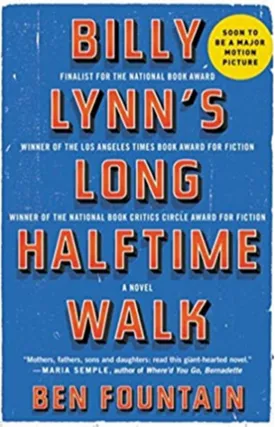Billy Lynn's Long Halftime Walk by Ben Fountain
Billy Lynn's Long Halftime Walk by Ben Fountain
Ben Fountain's 2012 novel Billy Lynn's Long Halftime Walk examines the experiences of the titular American infantryman shortly after his return to the States from Iraq. In the novel, it is Thanksgiving 2004, and nineteen-year-old Billy Lynn has just returned with the remainder of Bravo Company from a victorious battle in Iraq. In appreciation of their bravery, they have been chosen as part of a 'Victory Tour', which entails a halftime show at a Dallas Cowboys football game.
The novel takes place during the eight-hour interval between the soldiers' arrival in Dallas and their return flight to Iraq. During this time, Billy and his fellow soldiers grapple with the public's willingness to glorify them, their own internal struggles of grief and numbness, and their attempts to understand the people of the United States whose lives will never be disturbed by war as theirs have.
We observe the interactions that Billy and the rest of Bravo Company have with the people around them throughout their experience. We are shown how the civilians, who fail to take an understanding of the soldiers' problems, attempt to relate through jokes or compliments on the soldiers' physical strength and stature. Meanwhile, the military elite dealing with Bravo Company, who have yet to truly experience war and its aftermath, speak mainly in optics and tactics.
The majority of Billy's thoughts are focused on asking questions about his growing disconnect with life stateside. His musings often turn to his months spent in Iraq and how those experiences will never sit well with his memories of home. The flashbacks of the horrors of war that the soldiers experienced in Iraq are juxtaposed against the glamour of the football game and the cheer of the audience in attendance. The irony that the soldiers are forced to perform at this public spectacle of Patriots versus Cowboys while they themselves are feeling the effects of Iraq intensifies as the narrative progresses.
The setting of Billy Lynn's Long Halftime Walk, often cited as a major distinguishing factor of the novel, expresses the emptiness of civilian life in comparison to battle. At the halftime show, Billy notices the glitz, glamour, and artificiality that surrounds the spectacle, and his reaction is one of horror at the lengths with which the American public go to in order to distract themselves from the reality of the war they are fighting in Iraq.
Another prominent theme is the cultural disconnect between the American public and its soldiers. During their time in Dallas, Billy notices how little the public actually knows about the realities of the war, and how little they care to. Even his own family doesn't understand his battle experiences, and instead, tell stories about their own lives as if his experience in Iraq is comparable.
Throughout the novel, Ben Fountain explores the difficult truths of the modern American soldier, especially in relation to the disconnected public that finances the war from afar. The novel offers a scathing critique of how war and its soldiers are treated in American society. Its characters, both real and imagined, provide a brief but thought-provoking glimpse into the psychological cost of war for a soldier and the consequences of glorifying war with patriotism.
Overall, Billy Lynn's Long Halftime Walk is an extraordinary work of fiction that raises questions and explores many of the unfortunate realities of American society. The narrative's beautiful prose intrigues readers and immerses them in a world of complexities and contradictions. It is an important story of the human cost of our foreign policies, and one that provokes meaningful conversations and reflections.

